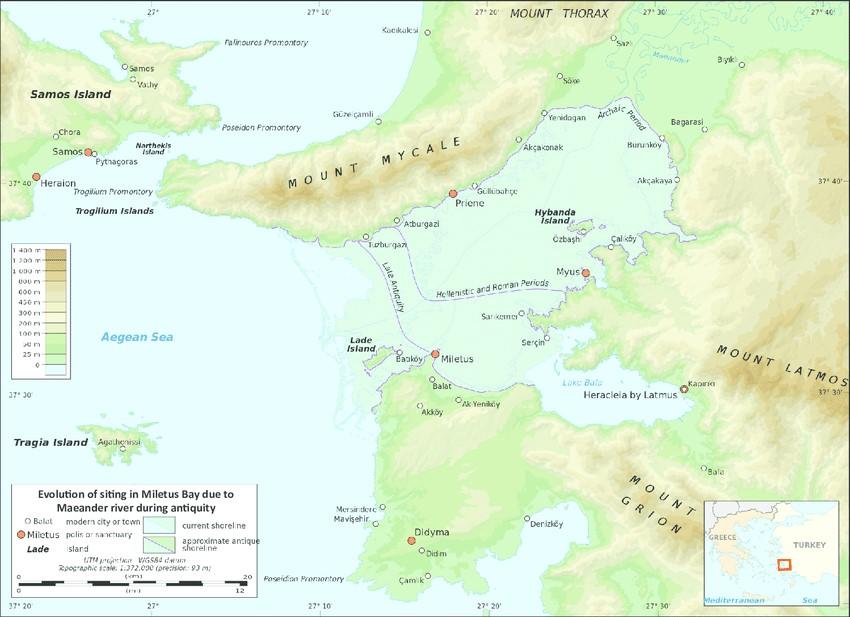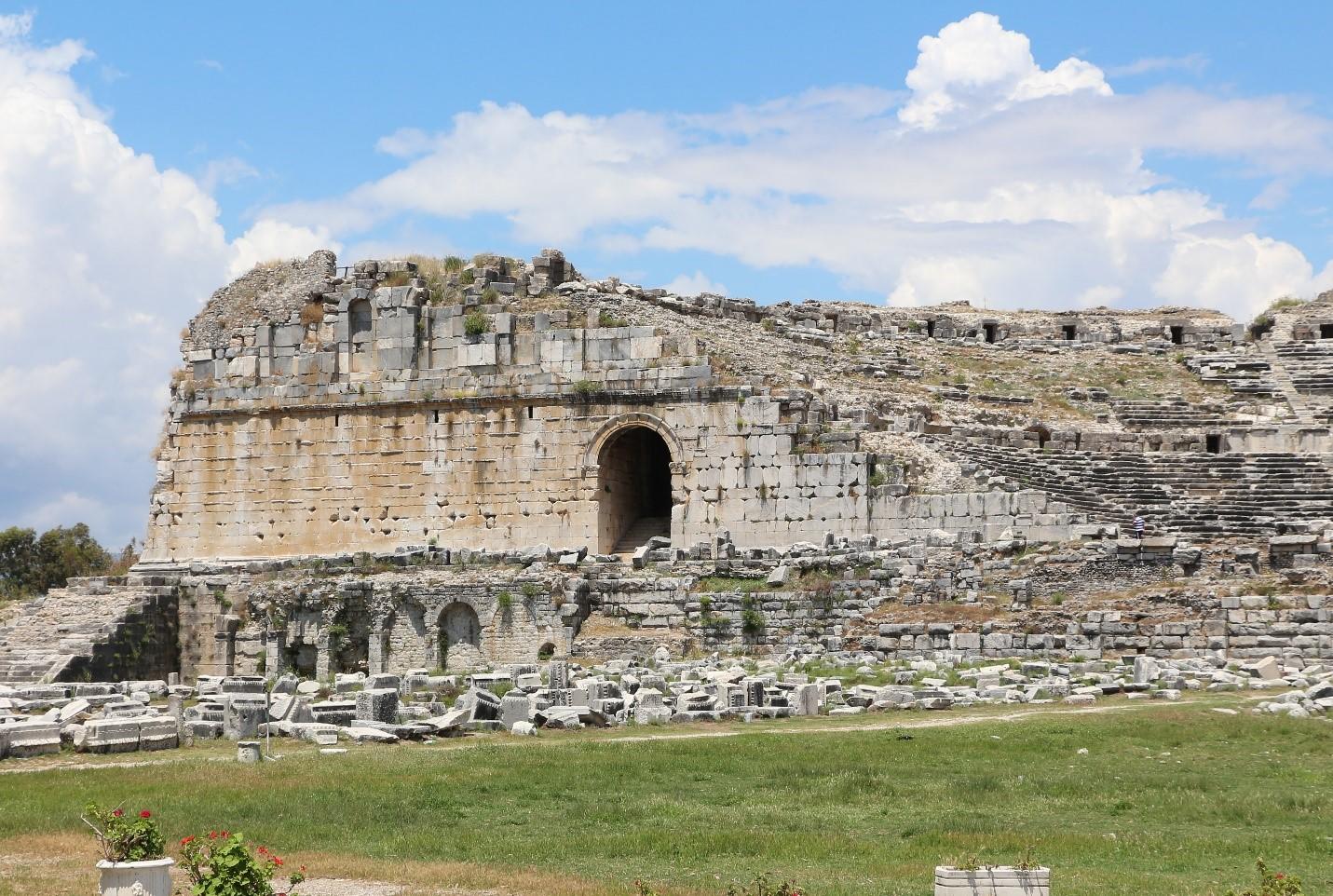Ask any teacher or parent, of a school-going child, “What is the toughest subject for kids?” and they will unequivocally answer “Maths!”. That is before they hit other toughies at high school, like physics or chemistry. Maths is the one subject that presents the greatest challenges to learners, from their early days at school, all the way through to matric, each year building on the concepts of the previous one.
What is the origin of the discipline, Mathematics, and what makes up its framework?
Making sense of all those mind-boggling concepts – circumferences, cosines, fractions, inequalities, quadrilaterals, relative numbers, reciprocals, symmetry, tangents, etc – becomes so much easier when viewed through the lens of history. A great person to examine, as a start, is the mathematician Thales. A study of his life will reveal some strategically important concepts and aid your use and understanding of them.

The Life of a Mathematician: Thales of Miletus
For any serious mathematics student there are two names that will become indelibly printed on your mind: Thales and Pythagoras. Born in Miletus around 625 BCE, Thales was, according to historical records, a professor who instructed Pythagoras. Thales is so widely regarded that he was recognised as one of the Seven Sages of ancient Greece, the other figures in the group being Bias of Priene, Cleobulus of Lindos, Chilon of Sparta, Periander of Corinth, Pittacus of Mytilene and Solon. These notables lived in Greece around 600 BCE, ahead of the well-known Greek philosophers Aristotle, Plato and Socrates.
Thales lived in the city, Miletus, which, at the time, had very good relations with Egypt, greatly admired as a centre of knowledge. As a young man, Thales spent some time studying there and was exposed to the wealth of knowledge that existed in Babylonian and Egyptian sciences. His studies centred around the subjects astronomy, geometry and philosophy, courses, at that time, reserved for the training of Egyptian priests.
On his return to Miletus, he established the School of Milesians and made use of his position to spread his knowledge of Greek philosophy and mathematics, while he continued to perform scientific experiments and observations. The way the world functioned fascinated him and he continually paid careful attention to natural phenomena. He made use of geometry to calculate the distance of ships from the shore and heights of pyramids. He also helped to predict a solar and a lunar eclipse and put the Thales theorem into practice.
Thales is recognised as the first individual to utilise deductive reasoning and apply it to geometry, thereby obtaining four corollaries to Thales’ theorem. Thales is also recognised as the first person to whom a mathematical discovery can be attributed.

Thales’ scientific and mathematical research is regarded as having been revolutionary at the time. Considered a sage, Thales always took pride in explaining his ideas from a rational point of view, as apposed to a mythological one, which was the default option of the age he lived in. Rather, through a process of observation, he created proofs as a basis for his scientific reasoning. Some accounts, written many years after his demise, stated that he had died around 547 BCE, at a gymnastics competition. Apparently, he had died in the bleachers of thirst, hunger and old age.
Thales’ influence on Mathematics Courses
Many people have heard of his work and of Thales’ theorem, in particular. He was the first person to make an impression on the history of mathematics through the creation of his scientific principles and formulae. Here follow five geometry theorems that have been credited to him:
- A circle is bisected by a diameter (part of circle geometry).
- The angles of a triangle are equal in size if the sides, opposite to those angles, are of equal length.
- A triangle can be drawn, if its triangle’s base and two angles are known.
- Any angle drawn in a semi-circle is a right angle.
- The opposite angles formed when two lines intersect and cross one another, are equal.
While these statements might sound easy or simple today, they, in fact, provide us with a lot of information and were quite revolutionary during Thales’ time. Some of Thales’ discoveries are utilised, even today, to calculate proportions in geometric figures, which have parallel lines, and certain relationships of longitude.
Although the Great Pyramid of Giza has been around for more than two millennia, nobody knew its actual height. Thales, using a stick, struck upon a brilliant way to calculate its height. He made it to stand upright in the soil and then measured its height. He reasoned that when the stick’s shadow equalled its height, the shadow of the pyramid would equal its height too. Brilliant, right? Sometimes it takes genius to figure out the obvious!
However, while Thales is credited with formulating these theorems, they were already common knowledge to the Egyptians and Babylonians in earlier times. Euclid’s book, Elements, explains some of it in the proportionality of areas of triangles of equal height. Thales, however, has been credited with having put words to it.
In many countries, Thales is not credited for some of his geometry theorems. In England, for example, one of his theorems is called the Theorem of Interception, while it is called the Theorem of Rays, in Germany. These are, in fact, not quite identical to Thales’ theorem, which rather resembles the Theory of Pythagoras.
Consider hiring a math tutor to learn more about Thales of Miletus and his foundational contributions to geometry and early mathematical theory.

Thales Migrates from Maths to Astronomy
All through his life, Thales made use of mathematics to make sense of important concepts in day-to-day living. For most things – addition, subtraction, architecture, decimals, equations, maths exercises, medians, philosophy, prime numbers, – Thales used maths as a tool to make sense of his world.
From early on in his career, he developed a love for astronomy and analysing what he saw in the sky. He is, therefore, regarded as one of the pioneering personalities behind Greek astronomy. Much as he had done in mathematics, Thales utilised the observation of constellations to make sense of how the universe worked.
Flowing from his study, he made the following discoveries:
- He listed the ephemeris
- Thales described the movement of the sun between the tropics
- He computed the length of a year utilising the intervals of the equinoxes and solstices
- He calculated how the ‘little dipper’ could be used to guide sailors on the open seas.
Further, Thales computed the length of a calendar year, the example we follow today, as being 365 and a quarter days. His work served as the basis for the introduction of a leap year. He, also, observed the movement of the stars and determined the diameter of both the moon and the sun. Although the method used was questioned by some observers, Thales was the first person to state that the size of the sun was “one seven hundred and twentieth (1/720) part of the solar circle and the size of the moon to be the same fraction of a lunar circle”. (iep.utm.edu)
Thales also ascertained the orbital inclination of the zodiac and fixed the position of Pleiades.
Aristotle also believed that Thales, thanks to his observations, might have predicted a huge olive harvest. More than anything else, Thales always made use of his observations to explain natural phenomena, thereby often bettering the lives of everyone around him. Thanks to him, navigation became more accurate because sailors learned how to orientate themselves on the open seas. Astronomy and its associated fields all owe Thales, the man who was not merely a mathematician, a huge debt of gratitude. This great man’s work even influenced the work of Rene Descartes, another great mathematician.
iven the importance of a strong foundation in mathematics for academic and future career success, it might be beneficial to hire an online mathematics tutor. An experienced tutor can offer personalized instruction, tailored to individual learning styles and needs, which can greatly enhance understanding of complex concepts, improve problem-solving skills, and boost overall confidence in the subject. This tailored support can make a significant difference in achieving academic goals and building a solid math foundation.
Thales Compared to Other Greats
Thales’ raft of discoveries have left a very special mark on the field of mathematics and many items studied today – arithmetic, complex functions, factorisation, multiplication, polygons, probability, whole numbers – are the result of his hard work and his quest for knowledge. These and many other discoveries, place Thales as one of the greatest mathematicians of all time!

More than just discovering things, Thales put forward knowledge (information) that had already been established by the Babylonians and Egyptians. Not only was he contented to know this information, he sought to observe and verify many of the affirmations that he had encountered, in the course of his studies, through mathematics.
Thales baffled his peers, leading Jean Voilquin, a French science editor, to state that Thales’ mission was to “replace mythological explanation” with “physical explanation.” His pioneering work led many scientific observers, including Voilquin, to refer to him as “one of the precursors to Greek science”. Adding to his scientific legacy are the many discoveries made by the School of Miletus. Their work transformed the scientific field and, over time, they became known as pre-Socratic philosophers. Thales’ specific way of teaching preferred visual observation and perception, which injected practicality into knowledge.
His school focussed mainly on astronomy and geometry, but also worked on other subjects, such as biology, physics and meta-physics. These students were the first to be referred to as ‘Physics-ians’ and they studied everything related to nature. The students and adherents to the teaching of the Miletus School made use of concepts such as the four elements to provide explanations for the way that the environment functioned, their studies having contributed greatly to the development of the sciences.
Thales did not only leave his indelible mark on mathematics of old, but also on the history of science, inspiring even the work of Sir Isaac Newton. If for no other reason, this is one to make sure we remember Thales, his name, his work and achievements, for many, many years (centuries maybe) into the future.
Summarise with AI:















